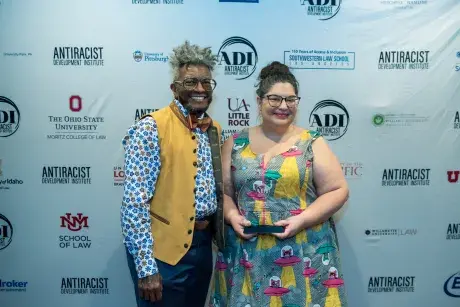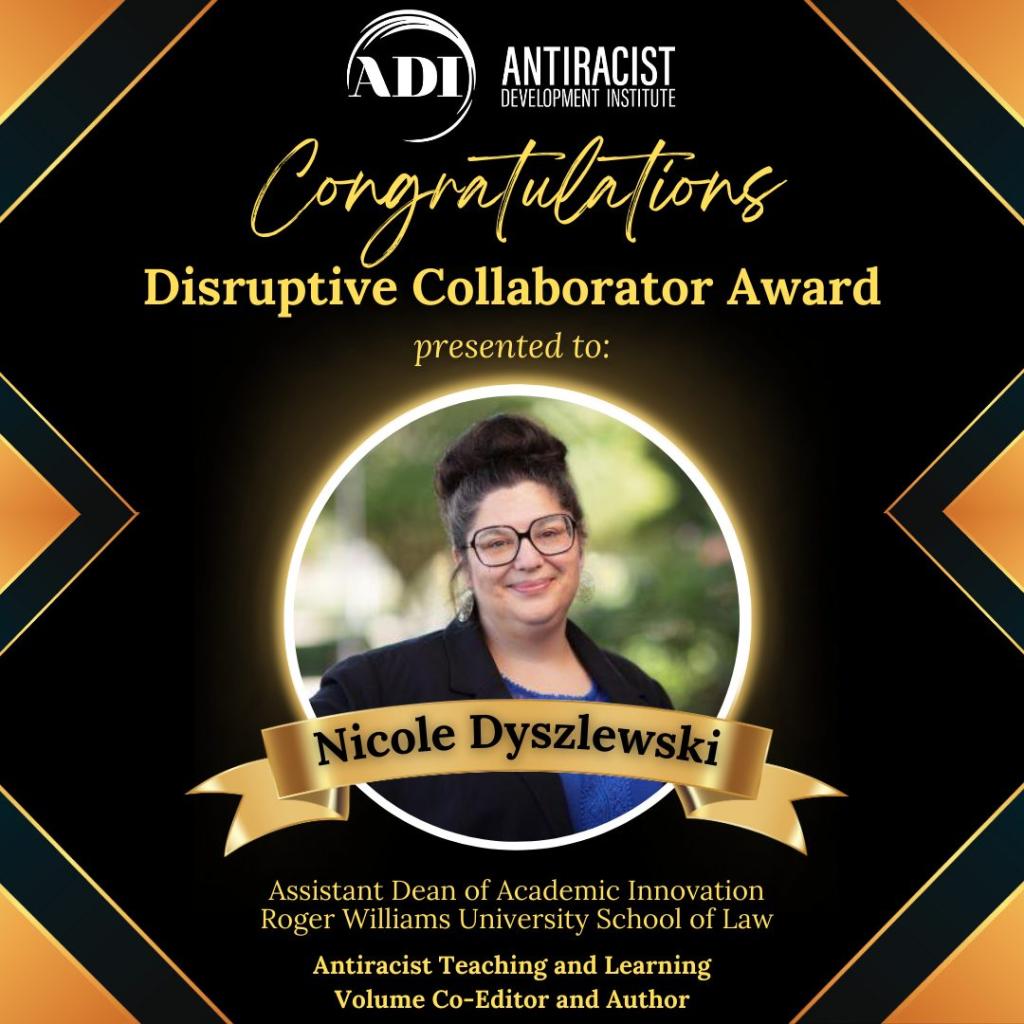Disrupting Legal Education for Equity
RWU Law professor Nicole Dyszlewski recognized by Penn State Dickinson Law's Antiracist Development Institute with a 'Disruptive Collaborator' award.

"We are a small law school, and the only one in Rhode Island, but we are punching above our weight in the diversity, equity, inclusion, and belonging space," Nicole Dyszlewski said.
The RWU Law professor was awarded the prestigious 2024 Disruptive Collaborator award from the Antiracist Development Institute at Penn State Dickinson Law. Overwhelmed by the honor, she said, "What means the most to me is that the award recognizes my collaborations with many others working together towards an antiracist future.”
RWU Law Dean Gregory W. Bowman said, "Disruptive Collaborator is a fitting title to capture Professor Dyszlewski's bold, innovative approach and unwavering commitment to partnership in advancing DEIB and social justice initiatives. We are immensely proud to have her on our team, where her visionary work always enhances our work in the classroom and the broader community."
Dyszlewski has spent her entire career in the legal sector, initially as an attorney for a real estate law firm. There, she was turned out of conference rooms when clients questioned her age and demanded that a male attorney represent them instead.
"I felt like there just wasn't room for me in the law practice, so I questioned myself," Dyszlewski said. "Ultimately, I realized that something wasn't wrong with me–it was that something was wrong with the law."
She switched tracks, went back to graduate school, and became a law librarian at RWU Law. After joining the school's Diversity Committee in 2016, students opened up to her. "Black students, in particular, started to confide that they didn't always feel like they belonged in the classroom," Dyszlewski shared. The curriculum at RWU Law, but also nationally, needed diversity content. Still, the faculty didn't know where to find it and was "afraid of saying the wrong thing."
Making room in law for everyone
As a librarian trained in pointing people toward the right resources, Dyszlewski knew that she could help. In collaboration with others dedicated to diversity in legal pedagogy, she co-edited the Integrating Doctrine and Diversity book series. The easy-to-use first book supplements the first-year law curriculum and was undergoing its final edits in the summer of 2020. "America was in a cultural moment of reckoning, and we were already there and ready to meet the moment," Dyszlewski said.
The American Bar Association soon changed its standards to require all law schools to include bias and cross-cultural training. However, RWU LAW took it further and introduced a new course for all second-year students: Race and the Foundations of American Law.
Dyszlewski, who developed the course with a group of colleagues, became a professor and now co-teaches it. The course begins by reviewing the history of colonialism and slavery and examining whether the US Constitution is inherently racist. Next, it asks how history impacts systems today and whether it is furthering white supremacy in areas like voting, housing, education, and mass incarceration. In the final section, they look towards the future.
"Students leave with a greater awareness of the systemic nature of racism in the US and how it's twisted up in America's founding and current reality. We are building empathy in students, and they will carry that with them into the legal community and in the way they relate to future clients," Dyszlewski explained.

Teaching empathy
It's iterative work that will never be completely done. At the ADI, Dyszlewski is part of a global network of collaborators in legal education and law firms working together to make the field antiracist by using a system design approach "to develop projects in areas such as transformative justice, leadership, and reimagining higher ed policy."
ADI Program Manager TaWanda Stallworth has worked shoulder-to-shoulder with Dyszlewski for several years. She said, "The ADI thrives on the type of authenticity and dedication that Nicole brings to her work…She makes the road to systemic equity easier to travel because she is a constant reminder that none of us are in this alone."
Dyszlewski agrees. "Our admissions office, our deans, our faculty, our students, and our alumni are all working on improving the system. It's still not perfect, but we will never stop working together to move forward at our school and in the wider legal education space."
